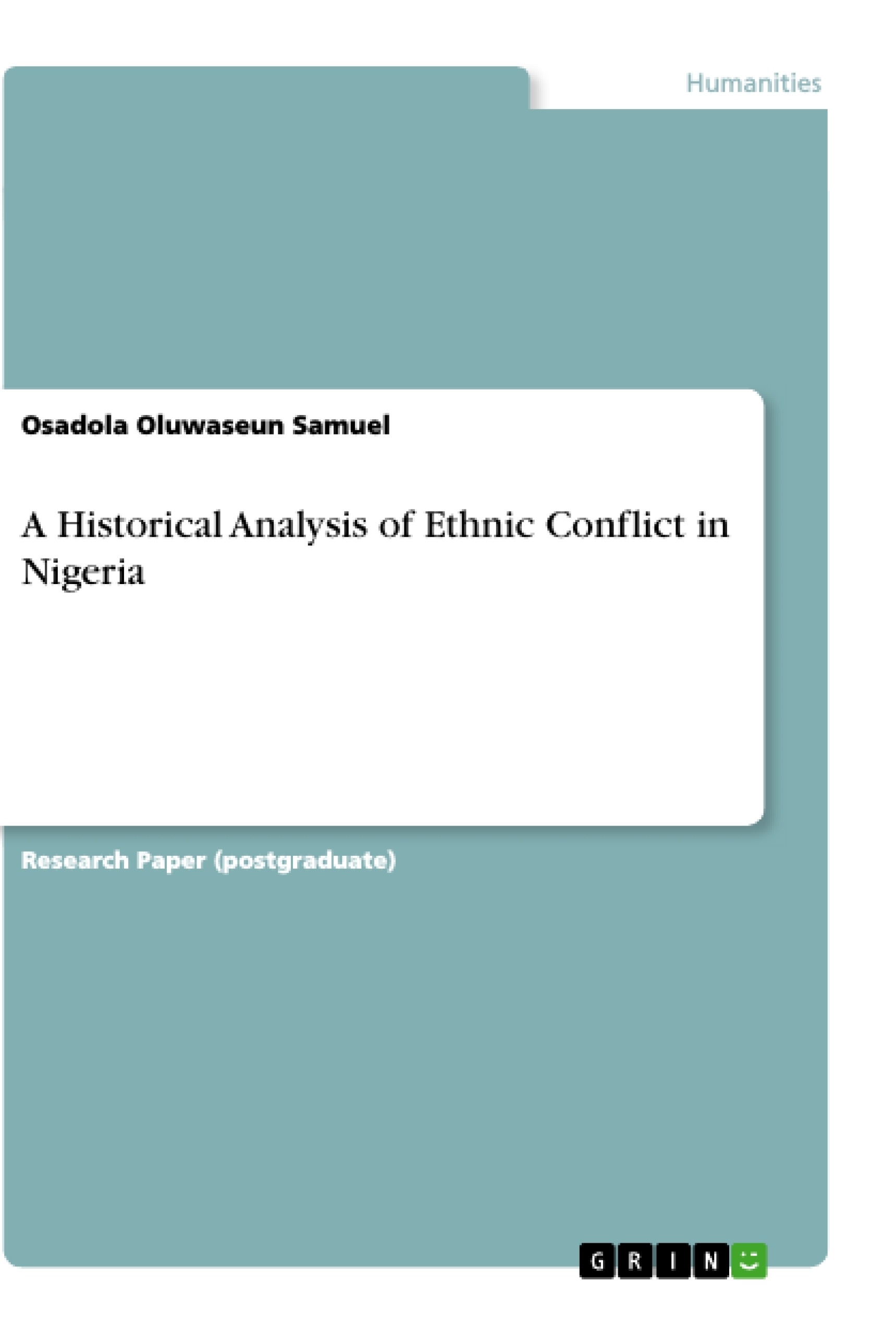Observably, most developing countries are ethnically diverse. Ethnic diversity may lead to increased civil dissonance. The National Question in Nigeria is probably one of the most complicated in the world with her over 250 ethnic groups and 120 different languages spoken in the country. The colonialist while pretending to carry out a mission of uniting the warring ethnic groups, wilfully and systematically separated the various Nigerian people thereby creating a suitable atmosphere for conflict. With the heterogeneous nature of the country, the tendency of the various nationals is towards parochial consciousness at the expense of national consciousness. This paper, therefore, relies on content analysis as its methodology to examine ethnic conflicts in Nigeria. It also examined the fundamental causes of ethnic conflicts in the country and identifies the possible issues for resolution. The paper also proffered suggestions on how to curb ethnic conflicts in future Nigeria.
Table of Contents
- Introduction
- Causes of Ethnic Conflicts in Nigeria
- Poverty
- Various Ethnic Conflicts and their Situations in Nigeria
Objectives and Key Themes
This paper aims to examine ethnic conflicts in Nigeria, exploring their fundamental causes and identifying potential solutions. It uses content analysis to analyze the situation and provide suggestions for curbing future conflicts.
- Causes of ethnic conflict in Nigeria
- The impact of colonialism on ethnic relations
- The role of poverty and resource scarcity in fueling conflict
- Specific examples of ethnic violence in Nigeria
- Potential strategies for conflict resolution
Chapter Summaries
Introduction: This introductory section establishes the context of ethnic conflicts in Nigeria, highlighting the country's ethnic diversity and the historical roots of these conflicts, tracing them back to the colonial era and its legacy of division. The introduction emphasizes the urgent need to address these conflicts to support the development of a sustainable democracy in Nigeria, particularly given the negative impact of ethnic tensions on economic and political progress.
Causes of Ethnic Conflicts in Nigeria: This chapter delves into the root causes of ethnic conflicts within the Nigerian context. It highlights the significant role of poverty and lack of development as major drivers. The text uses specific examples of violent clashes between different ethnic groups in various regions of Nigeria (Warri, Ondo State, Anambra State), illustrating how competition for scarce resources in impoverished communities escalates tensions and fuels violence. The analysis points to a connection between widespread poverty (evidenced by statistics from surveys like the Multiple Indicator Cluster Survey and the UNDP Human Development Report), lack of infrastructure, and the resulting feelings of fear, distrust, and hatred, which are all conducive to inter-ethnic conflict. The chapter emphasizes the systemic nature of underdevelopment as a primary factor contributing to these conflicts.
Keywords
Ethnic conflict, Nigeria, colonialism, poverty, resource scarcity, inter-ethnic violence, conflict resolution, sustainable democracy, national development, human development index.
Frequently Asked Questions: A Comprehensive Language Preview on Ethnic Conflicts in Nigeria
What is the main topic of this document?
This document is a comprehensive language preview providing an overview of a paper examining ethnic conflicts in Nigeria. It includes the table of contents, objectives and key themes, chapter summaries, and keywords.
What are the key themes explored in the paper?
The paper explores the causes of ethnic conflicts in Nigeria, focusing on the impact of colonialism, poverty, resource scarcity, and the role of these factors in fueling inter-ethnic violence. It also examines specific examples of ethnic violence and potential strategies for conflict resolution, aiming to contribute to understanding the development of a sustainable democracy in Nigeria.
What are the objectives of the paper?
The paper aims to examine ethnic conflicts in Nigeria, exploring their fundamental causes and identifying potential solutions. It uses content analysis to analyze the situation and provide suggestions for curbing future conflicts.
What causes of ethnic conflict are discussed?
The document highlights poverty and resource scarcity as major drivers of ethnic conflict. It emphasizes the systemic nature of underdevelopment and its contribution to feelings of fear, distrust, and hatred among different ethnic groups. The impact of colonialism and its legacy of division are also discussed.
What specific examples of ethnic violence are mentioned?
The chapter on causes of ethnic conflicts provides examples of violent clashes between different ethnic groups in regions like Warri, Ondo State, and Anambra State, illustrating how competition for scarce resources in impoverished communities escalates tensions and fuels violence.
What is the role of poverty and resource scarcity in the conflicts?
The paper argues that poverty and lack of development are significant drivers of ethnic conflict in Nigeria. Competition for scarce resources in impoverished communities exacerbates tensions and fuels violence. Statistics from surveys like the Multiple Indicator Cluster Survey and the UNDP Human Development Report are referenced to support this claim.
What strategies for conflict resolution are mentioned (or implied)?
While specific strategies aren't detailed in the preview, the paper aims to identify potential solutions for conflict resolution and contribute to building a sustainable democracy in Nigeria. This implies exploration of conflict resolution mechanisms in the full paper.
What is the significance of colonialism in the context of these conflicts?
The document highlights the impact of colonialism and its legacy of division as a contributing factor to the ethnic conflicts in Nigeria. The introduction specifically links the historical roots of these conflicts back to the colonial era.
What is the overall approach of the paper?
The paper uses content analysis to examine the situation of ethnic conflicts in Nigeria and provide suggestions for curbing future conflicts. The analysis aims to understand the systemic factors that contribute to these conflicts.
What keywords are associated with this paper?
Keywords include: Ethnic conflict, Nigeria, colonialism, poverty, resource scarcity, inter-ethnic violence, conflict resolution, sustainable democracy, national development, human development index.
- Quote paper
- Osadola Oluwaseun Samuel (Author), 2012, A Historical Analysis of Ethnic Conflict in Nigeria, Munich, GRIN Verlag, https://www.grin.com/document/202626




